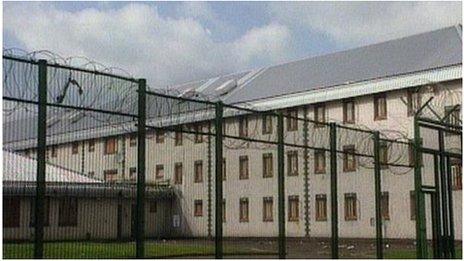Prison mobile phone signal blocking technology to go live
- Published

HMP Shotts is one of two pilot sites for the technology
Mobile phone signal blocking technology will go live in Scottish prisons within weeks, Justice Secretary Kenny MacAskill has announced.
Mr MacAskill made the announcement at HMP Shotts, one of two pilot sites for the technology.
The move follows legislation allowing the Scottish Prison Service to interfere with mobile phone signals.
The technology should enable prison authorities to detect and prevent prisoners' use of contraband phones.
The Scottish Prison Service (SPS) awarded contracts for the installation of the technology at HMPs Shotts and Glenochil. The two pilot sites are expected to be operating the technology by the end of the current financial year.
Mr MacAskill said: "This government made it a criminal offence for a prisoner to possess a mobile phone and the Scottish Prison Service has already invested considerably in the use of technology and intelligence capability to detect and prevent the use of mobile phones in our prisons.
"This new legislation will allow SPS to further extend their technology to disrupt the use of mobile phones by prisoners and is scheduled to be operational in a matter of weeks."
The Scottish Prison Service has linked mobile phone use in prison to criminal activities including the supply of drugs, organised crime and harassment.
Possession of a mobile phone by people in custody has been illegal since 2010. The SPS said 1,988 mobile phone handsets had been detected in Scottish prisons since 2011 - 212 of them in HMP Shotts.
In 2012 the Scottish Parliament agreed to extend the provisions of the Prisons (Interference with Wireless Telegraphy) Act, external, which was passed by the UK Parliament, to Scotland and allow prison governors to use jamming equipment.
- Published30 October 2012